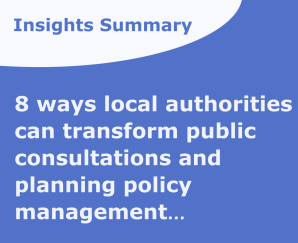
We're delighted to share 8 ways Planning Policy Teams can expand reach and public engagement on planning consultations, while saving time and valuable resource when delivering Local Development Plans:
1. Increased Accessibility:
Digital planning consultation software such as OpusConsult, can make planning documents, proposals, and feedback mechanisms more accessible to the public. This accessibility can lead to greater participation on local and neighbourhood plans from a broader range of stakeholders.
2. Efficiency:
By moving the consultation process online, local planning authorities can streamline the collection, organisation, and analysis of feedback. Digital platforms such as OpusConsult, can automate tasks such as sending notifications, collating responses, and generating reports, saving time and resources for local planning authorities, in turn reducing the burden of manual processing and operational costs.
3. Transparency:
Digital platforms such as OpusConsult, provide a transparent channel for communication between planning authorities, developers, and the public. Allowing stakeholders to view proposals, submit comments, and track the progress of their submissions and local planning progress, fosters trust and accountability in the decision-making process.
4. Data Analysis:
Digital planning consultation software such as OpusConsult, includes tools for analysing the data collected during the consultation process. This analysis can provide valuable insights into public opinion, preferences, and concerns, which can inform decision-making and help local planning authorities better understand the needs of their communities.
5. Engagement Tools:
Many digital planning consultation platforms such as OpusConsult, offer a range of engagement tools beyond simple comment submission, such as surveys, interactive maps, and multimedia content. These tools can help to make the consultation process more engaging and accessible to a wider audience.
6. Remote Participation:
Digital planning platforms such as OpusConsult, enable stakeholders to participate in the consultation process remotely, removing barriers such as travel time and physical attendance requirements. This can encourage greater participation from busy or marginalised communities who may not have been able to engage in traditional consultation methods.
7. Feedback Management:
Digital planning consultation software such as OpusConsult, often includes features for managing and responding to feedback efficiently. Local authorities can track responses, address common concerns, and communicate updates or changes to stakeholders in a timely manner.
8. Legal Compliance:
Many digital planning consultation platforms such as OpusConsult, are designed to help authorities comply with relevant legislation and regulations governing the consultation process. This can include features such as ensuring data protection and accessibility standards are met.
In summary, digital planning consultation software can help local planning authorities to modernise their consultation processes, increase public engagement, improve efficiency, and make more informed decisions that better reflect the needs and preferences of their communities.